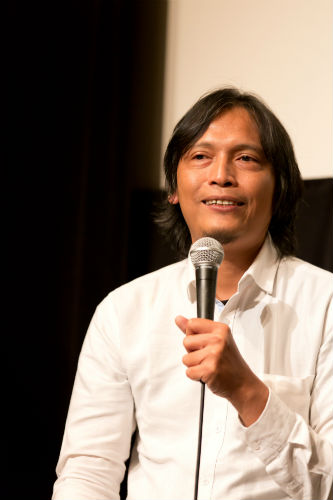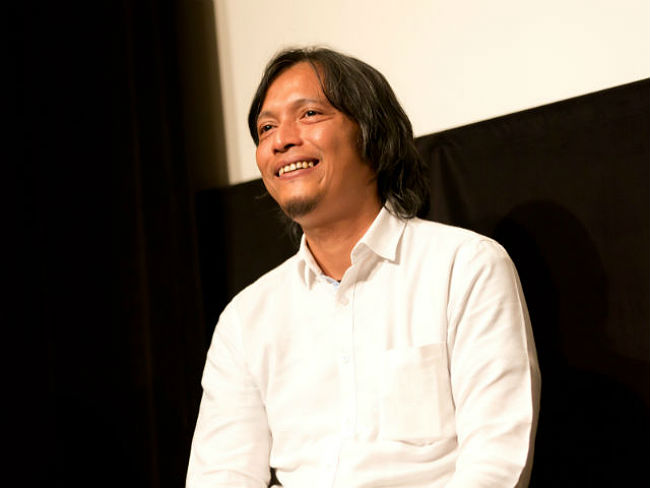Film Education in Yogyakarta
JFAC: Jakarta is the center of the film industry in Indonesia, and there are many filmmakers in the country. But there are just as many filmmakers in Jogja, too.
Cahyono: Yes, that's because in Jogja there is a particular atmosphere that makes it easy to talk to one another; you can meet the person or people straight away and everyone is friendly. It's very different from Jakarta where you always have to arrange schedules and appointments. So I think that atmosphere in Jogja has encouraged more creativity, and I think Jogja has a better environment for studying filmmaking.
JFAC: I heard that there is the Film Academy in Jogja where young people can study filmmaking.
Cahyono: Yes, Ifa built the Jogja Film Academy three years ago and we do lectures there.
JFAC: You also have the different types of film festivals on top of the community of filmmakers in Jogja so I imagine it really is a wonderful environment to learn filmmaking.
Cahyono: I think it's very important for us to be responsible for the future of cinema in Indonesia; teaching at the Jogja Film Academy is partly due to that sense of responsibility. The Academy has been gaining many students and I think it is going well so far.
JFAC: That's wonderful. Is director Garin Nugroho*2 a large presence in Jogja?
*2 One of the leading figures in Indonesian independent film whose first feature film is Love in a Slice of Bread (1991). Other selected films include Leaf on a Pillow (1998), Opera Jawa (2006), among others.
Cahyono: Yes. Garin Nugroho is a master in Indonesia. He was the one who worked hard to improve and develop the state of arthouse cinema in Indonesia. He understood the importance of the younger generation and I think that's why he established the Jogja-NETPAC Asian Film Festival (JAFF). Garin felts a sense of responsibility in improving film in Indonesia so he brought together younger people like Ifa, Ismail Basbeth,*3 and Yosep Anggi Noen*4 to run JAFF. So Garin played a big role in the rapid development of cultural cinema in Jogja.
*3 Indonesian filmmaker. Crescent Moon (2015) was screen in the Asia Future section at the 28th Tokyo International Film Festival and The Carousel Never Stops Turning (2017) was screened in the Crosscut Asia section for the 30th Tokyo International Film Festival.
*4 Indonesian filmmaker. Yosep Anggi Noen's A Lady Caddy Who Never Saw a Hole In One (2013) won the Grand Prix at the 2014 Short Shorts Film Festival & Asia. His feature film SOLO, SOLITUDE (2016) has gained wide recognition. He manages Limaenam Films, an independent production company in Yogyakarta.

JFAC: Do you sometimes film in Jakarta or other cities in Indonesia?
Cahyono: Right now, it's nearly impossible to make films in Jogja. With SITI, I was fortunate to have made some connections with international distributing companies; SITI was actually managed by Asian Shadows, an international distributor. They're very well-experienced, so I'm learning a lot from them in terms of filming and producing. I'm working with them for my second feature film.
About Asian Shadows and Distributing Films Worldwide
JFAC: How did you come to work with Asian Shadows?
Cahyono: It was with SITI. After we had the international premiere at the Singapore International Film Festival in 2014, there was a good review of the film in The Hollywood Reporter, and afterwards it was screened at the 2015 International Film Festival Rotterdam. Isabelle Glachant*5 from Asian Shadows tried to contact Ifa, but he didn't believe her at first; when Asian Shadows offered us a contract, things were chaotic for us and it was quite confusing. Ifa was a bit worried about the contract, about the distribution; he may have had a problem with distribution in the past. Despite our reservations, Asian Shadows tried hard to convince us and get the distributing rights for SITI. I'm told that Isabelle genuinely was excited about it; apparently she said to Ifa that she really loves the film, and that she wants to distribute the film to other countries and festivals so that many people can see it. She finally convinced him and stayed true to her word: Asian Shadows really helped SITI get exposed to many audiences in many countries and festivals.
*5 Film Producer. The founder and CEO of Asian Shadows. She is currently involved in the production of the coming films of Wang Xiaoshuai, Mouly Surya, Eddie Cahyono, Faozan Rizal, and newcomer LEI Lei.
JFAC: How was the reaction of the audience in other countries?
Cahyono: I think they really loved the film. I attended many of the film festivals with each screening of SITI; we went to Shanghai, Taipei, the Telluride in the United States, Hamburg, Hong Kong, and Freiburg. We found it easy to communicate with Asian Shadows and they were interested in collaborating with us. So it was a good match.

New Work: On Wasted Land
Cahyono: My new film project, Wasted Land won the ARTE International Prize at the 2015 Asian Project Market in Busan. So I was able to get some extra funding, and I have Ifa and Isabelle again as the producers for it. Now we're in the process of working on the script, but to be honest, I'm struggling a bit with it; I still need to work on it more .
JFAC: Can you tell us a bit more about it? What's the storyline for Wasted Land?
Cahyono: Wasted Land is about a young mother, desperately trying to meet her daughter who has been convicted of dealing drugs and has been sentenced to death in China. It's a story about a mother trying to see her daughter for one last time.
JFAC: Is there a reason you have female characters as your protagonist? As with SITI, Wasted Land revolves around another female, mother figure.
Cahyono: I'm more interested in the female roles in Indonesia; I find them more interesting than male roles or figures. There are many strong women in Indonesia who are working hard to earn a living, to support their families; so for me, it's more interesting to tell stories about women. Maybe one day, I will make a film about men, but for now, female characters will probably take center stage in my films.
JFAC: I very much look forward to your new film. Thank you very much.

[On July 26, 2017 at the Athénée Français Cultural Center]
More Information
Fourcolours Films Official Website
Asian Shadows Official Website
Jogja Film Academy Official Website (Indonesian)
Jogja-Netpac Asian Film Festival Official Website
SITI Trailer
Photo (Symposium): Masaki Koide






